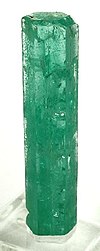Guavio Formation
| Guavio Formation | |
|---|---|
| Stratigraphic range: Tithonian-Berriasian ~ | |
| Type | Geological formation |
| Unit of | Cáqueza Group |
| Sub-units | Caliza de Las Mercedes Mb. Lutitas de Las Mercedes Mb. Caliza de Malacara Mb. Lutitas de Miralindo Mb. Conglomerado de Miralindo |
| Underlies | Macanal Formation |
| Overlies | Batá Fm., Girón Fm |
| Thickness | up to 1,000 m (3,300 ft) |
| Lithology | |
| Primary | Conglomerate |
| Other | Limestone, shale |
| Location | |
| Coordinates | 4°59′34.1″N 73°28′53.8″W / 4.992806°N 73.481611°W |
| Region | Altiplano Cundiboyacense Eastern Ranges, Andes |
| Country | |
| Type section | |
| Named for | Guavio River |
| Named by | Rodríguez & Ulloa |
| Location | Alto de Miralindo, Guateque |
| Year defined | 1976 |
| Coordinates | 4°59′34.1″N 73°28′53.8″W / 4.992806°N 73.481611°W |
| Region | Cundinamarca, Boyacá |
| Country | |
 Paleogeography of Northern South America 150 Ma, by Ron Blakey | |
The Guavio Formation (Spanish: Calizas del Guavio, Kicg) is a geological formation of the Altiplano Cundiboyacense, Eastern Ranges of the Colombian Andes. The formation consists of conglomerates, shales and limestones, dates to the Late Jurassic and Early Cretaceous periods; Tithonian to Berriasian epochs and has a maximum thickness of 1,000 metres (3,300 ft).
Etymology
[edit]The formation was defined and named in 1976 by Rodríguez and Ulloa after the Guavio River, Cundinamarca.[1]
Description
[edit]Lithologies
[edit]The Guavio Formation has a maximum thickness of 1,000 metres (3,300 ft), and is characterised by a sequence of conglomerates, shales and limestones.[1]
Stratigraphy and depositional environment
[edit]The Guavio Formation, the lowermost unit of the Cáqueza Group, overlies the Batá Formation and is overlain by the Macanal Formation. The unit is subdivided into five members, from old to younger; Conglomerado de Miralindo, Lutitas de Miralindo, Caliza de Malacara, Lutitas de Las Mercedes and Caliza de Las Mercedes. The age has been estimated to be Tithonian to Berriasian, spanning the Jurassic-Cretaceous boundary. Stratigraphically, the formation is time equivalent with the Arcabuco Formation. The formation has been deposited in a shallow marine environment in an oxygen-poor basin.[1]
Outcrops
[edit]The Guavio Formation is apart from its type locality at the Alto de Miralindo and Cuchilla de Manizales, found near Gachalá and Medina.[1]
Regional correlations
[edit]
See also
[edit]References
[edit]- ^ Jump up to: a b c d Acosta & Ulloa, 2002, p.51
Bibliography
[edit]- Acosta Garay, Jorge E.; Ulloa Melo, Carlos E. (2002), Mapa Geológico del Departamento de Cundinamarca - 1:250,000 - Memoria explicativa, INGEOMINAS, pp. 1–108, retrieved 2017-04-26
- García González, Mario; Mier Umaña, Ricardo; Cruz Guevara, Luis Enrique; Vásquez, Mauricio (2009), Informe Ejecutivo - evaluación del potencial hidrocarburífero de las cuencas colombianas, Universidad Industrial de Santander, pp. 1–219
- Villamil, Tomas (2012), Chronology Relative Sea Level History and a New Sequence Stratigraphic Model for Basinal Cretaceous Facies of Colombia, Society for Sedimentary Geology (SEPM), pp. 161–216
Maps
[edit]- Acosta, Jorge E; Ulloa, Carlos E. (1998), Plancha 246 - Geología de Fusagasugá - 1:100,000, INGEOMINAS, p. 1
- Ulloa, Carlos E; Rodríguez, Erasmo; Acosta, Jorge E. (1998), Plancha 227 - Geología de La Mesa - 1:100,000, INGEOMINAS, p. 1
- Ulloa, Carlos E; Rodríguez, Erasmo; Escovar, Ricardo (1998), Plancha 192 - Geología de Laguna de Tota - 1:100,000, INGEOMINAS, p. 1
- Renzoni, Giancarlo; Rosas, Humberto; Etayo Serna, Fernando (1998), Plancha 191 - Geología de Tunja - 1:100,000, INGEOMINAS, p. 1
- Fuquen M., Jaime A; Osorno M, José F. (2009), Plancha 190 - Geología de Chiquinquirá - 1:100,000, INGEOMINAS, p. 1
- Ulloa, Carlos E; Guerra, Álvaro; Escovar, Ricardo (1998), Plancha 172 - Geología de Paz de Río - 1:100,000, INGEOMINAS, p. 1
- Velandia, Francisco; Cepeda, Héctor (2005), Planchas 171 & 191 - Geología sector del sur del municipio de Paipa (Boyacá) - 1:25,000, INGEOMINAS
External links
[edit]- Gómez, J.; Montes, N.E.; Nivia, Á.; Diederix, H. (2015), Plancha 5-09 del Atlas Geológico de Colombia 2015 – escala 1:500,000, Servicio Geológico Colombiano, p. 1, retrieved 2017-03-16
- Geologic formations of Colombia
- Jurassic Colombia
- Cretaceous Colombia
- Jurassic System of South America
- Lower Cretaceous Series of South America
- Tithonian Stage
- Berriasian Stage
- Conglomerate formations
- Limestone formations
- Shale formations
- Shallow marine deposits
- Colombian emeralds
- Altiplano Cundiboyacense
- Geography of Cundinamarca Department
- Geography of Boyacá Department







